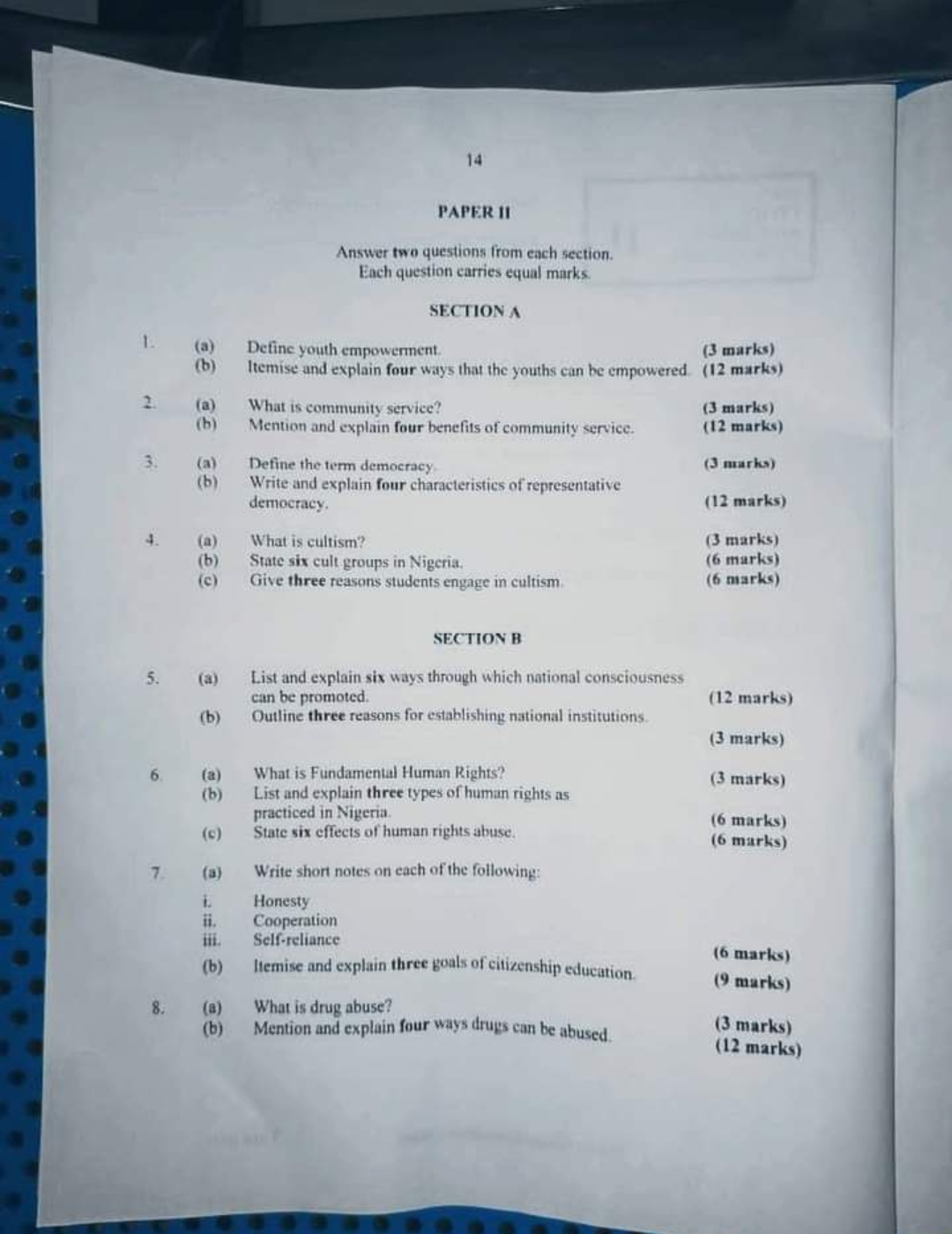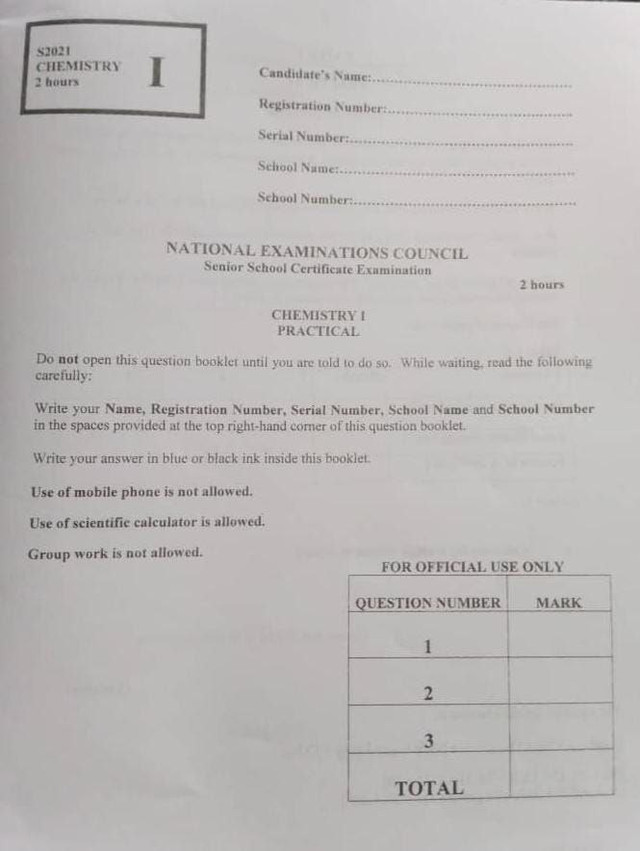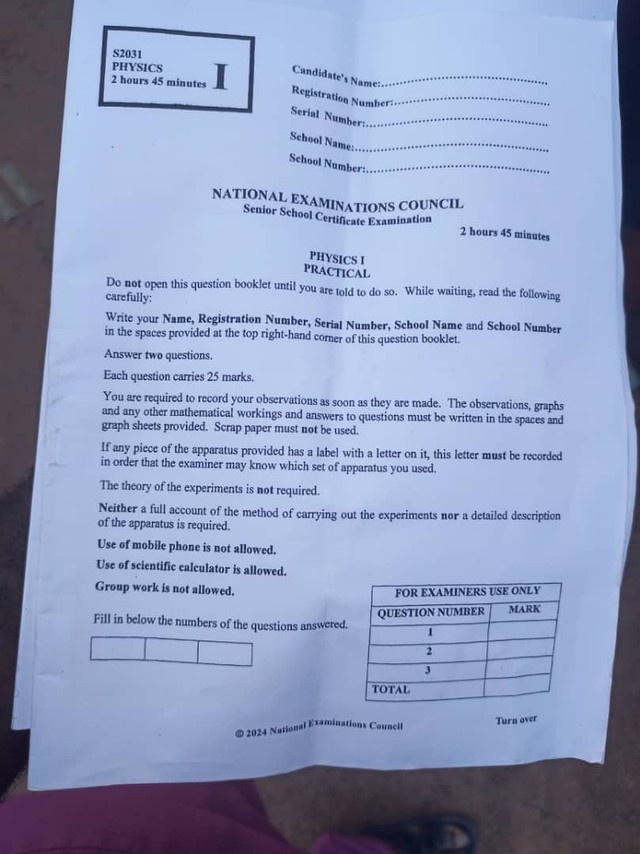NECO 2024 Civic Education OBJ & ESSAY Questions and Answers

NECO 2024 Update
Remember
You can still subscribe for NECO.Important
The price will go up next week!Subscribe Now
Pay now and get:
Added to NECO VIP Group
Answers sent to you from midnight
Subscribe now, don’t delay!
NOTE: NECO June/July 2024 Free civic Education objective and Theory/Essay Question and Answer Room: Pay just N1,500! Click on the link below to WhatsApp us and get the answers at 12 midnight. Prepare effectively and ensure your success in the exam with our comprehensive resources
CIVIC EDUCATION OBJ
1-10: DCCADAAEAA
11-20: DEBDDBCADE
21-30: BEEABDEEDB
31-40: BECBBECCCD
41-50: AAAEEABBAA
51-60: BCCEEEEBEB
COMPLETED!!!
=====================================
CIVIC EDUCATION ESSAY
++++++++++++++++++++++++++++++++++++++++++
INSTRUCTION: Answer two (2) questions from each section
++++++++++++++++++++++++++++++++++++++++++
SECTION A
NUMBER 1
(1a)
empowerment is a process where young people are encouraged and equipped with the skills, resources, and opportunities necessary to actively participate in their communities and make positive contributions to society. This concept involves enabling young individuals to take control of their lives, make informed decisions, and pursue their goals with confidence and autonomy.
(1bi)
(i)Education: Providing access to quality education and lifelong learning opportunities to enhance knowledge and skills.
(ii)Economic Opportunities: Facilitating access to employment, entrepreneurship, and financial resources to achieve economic independence.
(iii)Health and Well-being: Ensuring access to healthcare services, mental health support, and a safe environment to promote overall well-being.
(iv)Participation: Encouraging active involvement in civic activities, decision-making processes, and community service.
OR
NUMBER 1
(1a)
Youth empowerment refers to the process of equipping young people with the skills, knowledge, and resources they need to participate fully in society, make informed decisions, and have a positive impact on their lives and communities. It involves providing youth with opportunities to develop their leadership, decision-making, and problem-solving abilities.
(1b)
(PICK ANY FOUR)
(i) Education and Skills Training: Provide access to quality education and vocational training programs that develop youth’s skills and knowledge, enabling them to secure employment and pursue their aspirations.
(ii) Civic Participation: Encourage youth to participate in decision-making processes that affect their lives, such as youth councils, community planning groups, and political organizations. This fosters their sense of agency and allows them to advocate for their opinions.
(iii) Positive Role Models and Mentorship: Connect youth with adult role models and mentors who can provide guidance, support, and inspiration. These individuals can help youth develop self-confidence, make wise choices, and see a positive future for themselves.
(iv) Access to Resources and Information: Ensure that youth have access to information and resources they need to make healthy choices, such as health care, mental health services, and financial literacy programs. This empowers them to take control of their well-being and make informed decisions.
(v) Leadership Development: Provide opportunities for youth to lead projects, organizations, and initiatives. This develops their communication, teamwork, decision-making, and problem-solving skills, fostering their capacity to inspire and influence others.
(vi) Youth Engagement in Advocacy: Encourage youth to advocate for issues that are important to them, such as climate change, social justice, or education reform. By providing platforms for youth voices, they can learn about advocacy strategies, build confidence, and contribute to meaningful change in society.
====================
NUMBER 2
(2a)
Community service is voluntary work intended to help people in a particular area. It is often performed in collaboration with local organizations, such as non-profits, schools, and community groups,
(2b)
(i)
Elected Representatives: In a representative democracy, citizens elect officials to represent their interests and make decisions on their behalf. These representatives are typically chosen through regular,
(ii)
Rule of Law: Representative democracies operate under the rule of law, which means that laws are applied equally to all citizens, including elected officials. The legal framework is designed to protect individual rights and freedoms,
(iii)
Separation of Powers: Representative democracies often feature a separation of powers among different branches of government, typically the executive, legislative, and judicial branches. This system is designed to prevent any one branch from gaining too much power and to provide checks and balances.
(iv)
Pluralism and Political Participation: Representative democracies encourage a pluralistic society where multiple political parties, interest groups, and diverse opinions can coexist and compete for influence. Citizens have the right to participate in the political process through voting,
OR
NUMBER 2
(2a)
Community service refers to any type of unpaid work that benefits a community or its members. It involves individuals or groups volunteering their time and skills to address social, environmental, or educational needs within their local area. Community service can take various forms, such as volunteering at a homeless shelter, tutoring students, or cleaning up a local park.
(2b)
(PICK ANY FOUR)
(i) Personal Growth and Development: Community service provides opportunities for personal growth by developing skills such as empathy, compassion, teamwork, and leadership. It also fosters a sense of purpose and accomplishment.
(ii) Community Building: Community service strengthens communities by bringing people together to work towards a common goal. It promotes social cohesion, reduces isolation, and creates a sense of belonging.
(iii) Civic Responsibility: Community service instills a sense of civic responsibility in individuals. It teaches them the importance of giving back to their community and contributing to the greater good.
(iv) Career Exploration: Community service can help individuals explore different career paths and develop valuable skills that are transferable to the workplace. It also provides opportunities to network and build professional connections.
(v) Improved Health and Well-being: Studies have shown that engaging in community service can improve mental and physical health. It reduces stress, promotes physical activity, and fosters a sense of well-being.
(vi) Enhanced Resume and College Applications: Community service is valuable experience that can enhance resumes and college applications. It demonstrates an individual’s commitment to their community and develops skills that are highly sought after by employers and universities.
====================
NUMBER 3
(3a)
Democracy is a form of government where power is held by the people, either directly or through elected representatives.
(3b)
(i) Free and Fair Elections: Citizens elect their representatives through a free and fair process, ensuring that the will of the people is reflected in the government. This means that elections are conducted without fraud, intimidation, or manipulation.
(ii) Representation: Citizens elect representatives to make decisions on their behalf. These representatives are accountable to the people and are expected to represent their constituents’ interests in the government.
(iii) Separation of Powers: A system of checks and balances is in place to prevent any one branch of government (legislative, executive, or judicial) from abusing its power. This ensures that power is distributed evenly and that no single branch dominates the others.
(iv) Accountability: Government officials and representatives are accountable to the people. They are responsible for their actions and must answer to the citizens who elected them. This is achieved through various mechanisms, such as regular elections, public scrutiny, and institutional checks.
OR
NUMBER 3
(3a)
Democracy is a system of government in which all or most citizens have the power to impact the decisions that affect their lives. It is based on the principles of popular sovereignty, equality, and majority rule, with minority rights protected.
(3b)
(PICK ANY FOUR)
(i) Elected Representatives: Citizens elect representatives to make decisions on their behalf. These representatives are responsible for creating and implementing laws, policies, and regulations.
(ii) Limited Government: The power of government is limited by a constitution or other legal framework. This prevents any one person or group from having absolute control.
(iii) Rule of Law: All citizens, including those in power, are subject to the same laws. This ensures equality before the law and prevents arbitrary or unjust treatment.
(iv) Majority Rule with Minority Rights: Decisions are made by a majority vote, but the rights and interests of minority groups are protected through constitutional guarantees and other safeguards.
(v) Free and Fair Elections: Citizens have the right to vote in free and fair elections, choosing their representatives from multiple candidates. This ensures that the government is accountable to the people.
(vi) Civil Liberties: Citizens enjoy fundamental rights and freedoms, such as freedom of speech, assembly, and religion. These rights protect individual autonomy and prevent government overreach.
====================
NUMBER 4
(4a)
Cultism refers to the practices and activities associated with cults, which are secretive and often involve rituals and extreme loyalty to a particular group. Cults may engage in illegal or harmful activities, and their members often exhibit blind obedience to their leaders.
(4b)
(i) Pyrates Confraternity
(ii) Vikings Confraternity
(iii) Black Axe Confraternity
(iv) Buccaneers Confraternity
(v) Klansmen Konfraternity
(vi) Supreme Eiye Confraternity
(4c)
(i) Peer Pressure and Social Status: Many students join cults to gain a sense of belonging, prestige, and respect from their peers. Cult membership is often seen as a symbol of power, strength, and influence.
(ii) Protection and Security: Some students join cults for protection and security, especially in environments where violence and intimidation are common. Cults often provide a sense of safety and support for their members.
(iii) Financial Benefits and Material Gains: Cults often engage in illegal activities, such as extortion, robbery, and fraud. Students may join cults to gain access to financial resources, material possessions, and other benefits.
====================
SECTION B
NUMBER 5
(5a)
(i) Education: Incorporate national history, culture, and values into school curricula to instill a sense of national identity and pride in citizens from a young age.
(ii) Media: Utilize media outlets to promote nationalistic content, such as documentaries, films, and programs that showcase the country’s achievements and heritage.
(iii) National Symbols: Display and explain the significance of national symbols like flags, anthems, and emblems to foster a sense of unity and shared identity.
(iv) Cultural Events: Organize cultural festivals, celebrations, and exhibitions to showcase the country’s diverse heritage and promote cross-cultural understanding.
(v) National Service: Implement national service programs that bring citizens together to work on projects that benefit the country, fostering a sense of shared responsibility and patriotism.
(vi) Leadership: Encourage leaders to promote national consciousness through their speeches, actions, and policies, setting a positive example for citizens to follow.
(5b)
(I)Preservation of Heritage: National institutions like museums, archives, and libraries help preserve a nation’s history, culture, and traditions for future generations.
(II) Promotion of Unity: National institutions like national theaters, festivals, and events bring citizens together, promoting a sense of shared identity and unity.
(III) Development and Progress: National institutions like research centers, academies, and think tanks drive innovation, research, and development, contributing to a nation’s progress and prosperity.
====================
NUMBER 6
(6a)
Fundamental human rights are basic rights and freedoms that are inherent to all human beings, regardless of their race, gender, nationality, or status. These rights are universal, inalienable, and indispensable for the dignity and well-being of individuals.
(6b)
(i) Civil and Political Rights: These rights include freedom of speech, assembly, association, and movement. They also include the right to life, liberty, and security of person, as well as freedom from discrimination and equality before the law.
(ii) Economic, Social, and Cultural Rights: These rights include the right to education, healthcare, housing, and social security. They also include the right to work, fair wages, and safe working conditions.
(iii) Environmental and Developmental Rights: These rights include the right to a clean and healthy environment, as well as the right to development and improvement of one’s quality of life.
(6c)
(i) Physical Harm: Human rights abuse can result in physical harm, injury, or even death.
(ii) Psychological Trauma: Victims of human rights abuse may suffer from psychological trauma, including anxiety, depression, and post-traumatic stress disorder (PTSD).
(iii) Displacement and Migration: Human rights abuse can lead to displacement and migration, as individuals and communities flee from persecution or violence.
(iv) Social and Economic Instability: Human rights abuse can lead to social and economic instability, as individuals and communities are denied their rights and opportunities.
(v) Lack of Trust and Social Cohesion: Human rights abuse can erode trust in government and institutions, leading to social unrest and division.
(vi) Underdevelopment and Poverty: Human rights abuse can perpetuate underdevelopment and poverty, as individuals and communities are denied their rights and opportunities.
====================
NUMBER 7
(7a)
(i) Honesty:
Honesty is the quality of being truthful and transparent in one’s actions and words. It involves integrity and a commitment to being fair and just. Honest individuals are trusted and respected in society, and honesty is crucial for building and maintaining relationships.
(ii) Cooperation:
Cooperation is the act of working together towards a common goal. It involves collaboration, teamwork, and mutual support to achieve shared objectives. Cooperation is essential in various settings, including workplaces, communities, and families, as it fosters harmony and efficiency.
(iii) Self-reliance:
Self-reliance is the ability to depend on oneself and one’s own resources. It involves independence, self-sufficiency, and confidence in one’s abilities. Self-reliant individuals can solve their problems and make decisions without excessive dependence on others.
(7b)
(i) Informed Citizens:
To educate individuals about their rights, responsibilities, and the workings of their government. Informed citizens are aware of their civic duties and the importance of participating in the democratic process.
(ii) Active Participation:
To encourage active participation in civic and political processes. Citizenship education motivates individuals to engage in activities such as voting, community service, and advocacy.
(iii) Social Cohesion:
To promote social cohesion and understanding among diverse groups within the nation. Citizenship education fosters respect for diversity and encourages unity and cooperation among different communities.
====================
NUMBER 8
(8)
Drug abuse, also known as substance abuse, refers to the harmful or hazardous use of psychoactive substances, including alcohol and illicit drugs. It involves the repeated and excessive use of these substances, leading to physical, psychological, and social problems.
(8b)
(i) Taking larger doses than prescribed: This includes taking more pills or tablets than directed, or using more of a substance than recommended by a doctor. This can lead to overdose and increase the risk of adverse effects.
(ii) Using drugs for non-medical purposes: This involves using drugs to get high, cope with stress, or for recreational purposes. This can lead to addiction and neglect of important responsibilities and relationships.
(iii) Using drugs without a prescription: This includes taking prescription medications that are not prescribed to you, or using someone else’s prescription. This can be dangerous, as you may not know the proper dosage or potential interactions with other medications.
(iv) Combining drugs with other substances: This includes mixing drugs with alcohol, other medications, or illicit substances. This can increase the risk of adverse effects, overdose, and addiction, and can also lead to unpredictable and dangerous interactions.
OR
NUMBER 8
(8a)
Drug abuse refers to the use of drugs through self-medication or without due medical prescription and administration. It involves the indiscriminate use of any drug, such as marijuana (Indian hemp), heroin, morphine, cocaine, stimulants, alcohol, and others.
(8b)
(PICK ANY FOUR)
(i) Taking more than the prescribed dose: This is common with prescription medications. People may believe that taking more will provide faster or stronger relief, but it can lead to overdose and other serious health consequences.
(ii) Using someone else’s prescription: Prescription medications are tailored to an individual’s specific needs and medical history. Using someone else’s prescription can be dangerous and ineffective, as it may not be the right drug or dosage for you.
(iii) Taking drugs for non-medical reasons: This includes using prescription medications or illegal drugs to get high, relax, or enhance performance. It can lead to addiction and other health problems.
(iv) Mixing drugs: Combining different drugs, whether prescription, over-the-counter, or illegal, can have unpredictable and dangerous effects. It can increase the risk of overdose and other adverse reactions.
(v) Using drugs in ways other than intended: This includes crushing pills to snort them, injecting oral medications, or smoking substances not meant to be smoked. These methods can be more harmful and increase the risk of addiction.
(vi) Continuing to use drugs despite negative consequences: This is a key sign of addiction. If drug use is causing problems in your life, such as health issues, relationship problems, or job loss, and you continue to use despite these consequences, it’s a sign of abuse.
(vii) Using drugs to self-medicate: Some people use drugs to cope with stress, anxiety, or depression. While it may provide temporary relief, it can worsen the underlying problem and lead to addiction.
=====================================
COMPLETED!!!
=====================================


